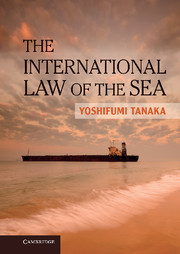Book contents
- Frontmatter
- Contents
- Preface
- Acknowledgements
- Figures
- Tables
- Abbreviations
- Table of Cases
- Table of Treaties and Instruments
- Part I The Divided Oceans: International Law Governing Jurisdictional Zones
- 1 The Law of the Sea in Perspective
- 2 Baselines and Related Issues
- 3 Marine Spaces under National Jurisdiction I: Territorial Sovereignty
- 4 Marine Spaces under National Jurisdiction II: Sovereign Rights
- 5 Marine Spaces beyond National Jurisdiction
- 6 Maritime Delimitation
- Part II Our Common Ocean: Protection of Community Interests at Sea
- Index
- References
5 - Marine Spaces beyond National Jurisdiction
Main Issues
from Part I - The Divided Oceans: International Law Governing Jurisdictional Zones
- Frontmatter
- Contents
- Preface
- Acknowledgements
- Figures
- Tables
- Abbreviations
- Table of Cases
- Table of Treaties and Instruments
- Part I The Divided Oceans: International Law Governing Jurisdictional Zones
- 1 The Law of the Sea in Perspective
- 2 Baselines and Related Issues
- 3 Marine Spaces under National Jurisdiction I: Territorial Sovereignty
- 4 Marine Spaces under National Jurisdiction II: Sovereign Rights
- 5 Marine Spaces beyond National Jurisdiction
- 6 Maritime Delimitation
- Part II Our Common Ocean: Protection of Community Interests at Sea
- Index
- References
Summary
This chapter will examine rules governing marine spaces beyond the limits of national jurisdiction, namely, the high seas and the Area. The high seas are essentially characterised by the principle of freedom of the sea, and order in the high seas is ensured primarily by the flag State. Thus the principle of the exclusive jurisdiction of the flag State and its exceptions are key issues underlying international law governing the high seas. However, the Area is governed by the principle of the common heritage of mankind. This principle is innovative because it may bring new viewpoints beyond the State-to-State perspective in the law of the sea. Against that background, this chapter will discuss particularly the following issues:
What is the principle of freedom of the high seas?
What is the function of the principle of the exclusive jurisdiction of the high seas?
What are the problems associated with flags of convenience and how is it possible to address them?
What are the peace-time exceptions to the principle of the exclusive jurisdiction of the flag State on the high seas?
What is the raison d’être of the principle of the common heritage of mankind?
To what extent was the regime governing the Area in the LOSC changed by the 1994 Implementation Agreement?
Is the common heritage of mankind still a significant principle governing the Area?
Introduction
The high seas are governed by the principle of freedom. However, it is not suggested that there is no legal order on the high seas. The order on the high seas is essentially ensured by the principle of the exclusive jurisdiction of the flag State. Thus this principle and its exceptions become principal issues in the international law governing the high seas.
- Type
- Chapter
- Information
- The International Law of the Sea , pp. 149 - 185Publisher: Cambridge University PressPrint publication year: 2012



